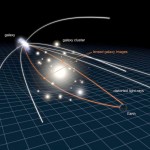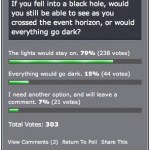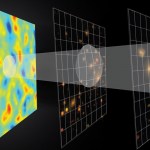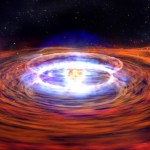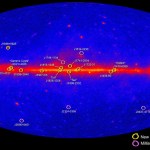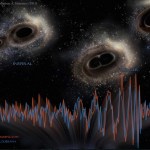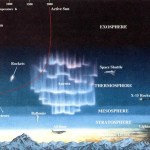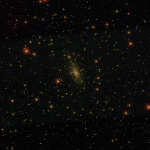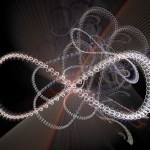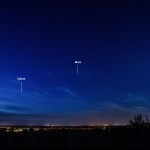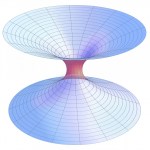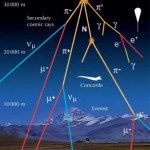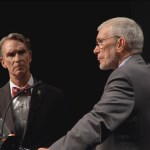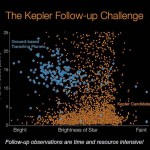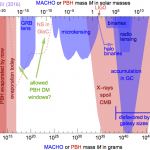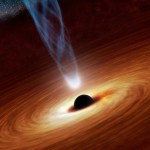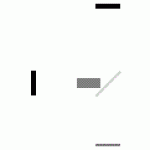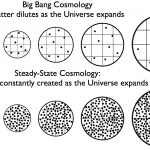
"We find them smaller and fainter, in constantly increasing numbers, and we know that we are reaching into space, farther and farther, until, with the faintest nebulae that can be detected with the greatest telescopes, we arrive at the frontier of the known universe." -Edwin Hubble
When you look out at the distant Universe, you can see all sorts of things: stars, galaxies, clusters of galaxies, going as far back into the distant past as our telescopes can image. But where you have the greatest concentrations of mass, an extreme phenomenon emerges: that of gravitational lensing. Any foreground…
“It all had a beginning in the original cosmic explosion, whatever that was, and it'll all have an end when all the stars run down.” -Isaac Asimov, The Last Question
Each week brings new challenges, new questions, new topics and new things to think about here at Starts With A Bang! For those of you looking for something awesome to do later this month, come to Seattle, Washington's May 24th event: Astronomy On Tap, at Peddler Brewing Company, where I'll be speaking! Beyond that, I just received my first look at the layout of the inside of my upcoming book, Treknology, and it's going…
“Despite its name, the big bang theory is not really a theory of a bang at all. It is really only a theory of the aftermath of a bang.” -Alan Guth
When we look to the deepest reaches of space, we can look for the “first” of any type of object. The first galaxy, the first star, the first light from the CMB, or even the first signals from the Big Bang, like gravitational waves. Yet these signals all have very different redshifts from one another, and perhaps more puzzlingly, lie at extraordinarily different cosmic distances from us.
Looking towards the north pole of the Milky Way galaxy,…
"End? No, the journey doesn't end here. Death is just another path, one that we all must take. The grey rain-curtain of this world rolls back, and all turns to silver glass, and then you see it." -J.R.R. Tolkien
Stars live for a variety of ages, from just a million or two years for some to tens of trillions of years for others. But even after a star has run out of its fuel and died, its stellar corpse continues to shine on. Neutron stars and white dwarfs are both extremely massive, but very small in volume compared to a star. As a result, they cool very slowly, so slow that a single one has…
"Two recent studies by teams in the U.S. and the Netherlands have shown that the gamma-ray excess at the galactic center is speckled, not smooth as we would expect for a dark matter signal. Those results suggest the speckles may be due to point sources that we can’t see as individual sources..." -Eric Charles
When NASA’s Fermi satellite began operations, it didn’t take long before we had constructed the most accurate, comprehensive gamma ray map of the galaxy. While many outstanding astrophysics findings ensued, including the discovery of many new pulsars, there was one particular mystery…
"We have never observed infinity in nature. Whenever you have infinities in a theory, that's where the theory fails as a description of nature. And if space was born in the Big Bang, yet is infinite now, we are forced to believe that it's instantaneously, infinitely big. It seems absurd." -Janna Levin
You’ve likely heard that there’s no sound in space; that sound needs a medium to travel through, and in the vacuum of space, there is none. That’s true... up to a point. If you were only a few light years away from a star, stellar remnant, black hole, or even a supernova, you’d have no way to…
"Whether humans are responsible for the bulk of climate change is going to be left to the scientists, but it's all of our responsibility to leave this planet in better shape for the future generations than we found it." -Mike Huckabee
It only makes sense that scientists should debate and argue over the findings in their field. Given all the suites of data available that are relevant to a particular physical phenomenon, how do we put it together in a way that is scientifically robust, allow us to understand and predict what’s happening, and justifiably attribute the causes of observed…
"There is always a heavy demand for fresh mediocrity. In every generation the least cultivated taste has the largest appetite." -Paul Gauguin
From our vantage point within the Milky Way, it sure does appear impressive. Hundreds of billions of stars shine in our own cosmic backyard, with our galaxy spanning a whopping 100,000 light years from end-to-end. Yet not only is that small compared to our nearest large neighbor, Andromeda, but it’s not even 20% as large as the largest spiral galaxies we find.
Severely disrupted galaxies, like NGC 6872, can extend for many times farther than a quiet…
“Time travel used to be thought of as just science fiction, but Einstein's general theory of relativity allows for the possibility that we could warp space-time so much that you could go off in a rocket and return before you set out.” -Stephen Hawking
As always, there's been a new fantastic week of articles here at Starts With A Bang, punctuated by our new podcast this month, on the physics of time travel!
Have a listen (or download it and take it with you) and thank our Patreon supporters for making it possible! Now, what was this past week all about? Come enjoy some fabulous stories…
"I long ago abandoned the notion of a life without storms, or a world without dry and killing seasons. Life is too complicated, too constantly changing, to be anything but what it is. And I am, by nature, too mercurial to be anything but deeply wary of the grave unnaturalness involved in any attempt to exert too much control over essentially uncontrollable forces." -Kay Redfield Jamison
Under ideal conditions, Mercury achieves a maximum elongation, or angular separation, from the Sun of 28 degrees. Total darkness is achieved when the Sun dips 18 degrees below the horizon. So for many of us,…
"One of the great things about music is that it has the capability of time travel - you smell a certain smell in the room and it takes you back to your childhood. I feel like music is able to do that, and it happens to me all the time." -M. Ward
Have you ever wondered about time travel? Perhaps you have your destination in the far future, and want to see how it all turns out? Maybe you want to return to the past, and alter the future or present by your actions there? Or maybe you want to freeze time altogether? If you want to know whether it's possible, the physics of relativity holds the…
"The experiments that we will do with the LHC [Large Hadron Collider] have been done billions of times by cosmic rays hitting the earth. ... They're being done continuously by cosmic rays hitting our astronomical bodies, like the moon, the sun, like Jupiter and so on and so forth. And the earth's still here, the sun's still here, the moon's still here." -John Ellis
Relativity, or the idea that space and time are not absolute, was one of the most revolutionary and counterintuitive scientific theories to come out of the 20th century. It was also one of the most disputed, with hundreds of…
"You must remember, my dear lady, the most important rule of any successful illusion: First, the people must want to believe in it." -Libba Bray
There are many times throughout history that science -- and scientists -- have gotten it wrong. And there are many topics today that are quite polarized, from the Big Bang and evolution to vaccines, fluoridation, chemtrails and climate change. There are many public debates that play out, sometimes in nasty ways, surrounding all of these topics.
A Nigerian health worker tries to immunise a child during vaccination campaign against polio. The…
"A few centuries ago, the pioneer navigators learnt the size and shape of our Earth, and the layout of the continents. We are now just learning the dimensions and ingredients of our entire cosmos, and can at last make some sense of our cosmic habitat." -Martin Rees
You might think that Jupiter is the largest planet in the Solar System because it’s the most massive, but that’s not quite right. If you kept adding mass to Saturn, it would get larger in size, but if you kept adding mass to Jupiter, it would shrink! For a given set of elements that your planet is made out of, there’s a maximum…
“Perseverance is not a long race; it is many short races one after the other.” -Walter Elliot
It's been two great weeks here at Starts With A Bang, where we've seen an incredible slew of new articles, new contributions, and literally hundreds of comments where nobody needed to get banned! To all of those who made it out to see me last weekend at NorWesCon, thank you for your incredible support, and to those who didn't, I hope things have gone well for you, and that you've enjoyed all our articles! To take a look back, here's what we've seen over the past two weeks:
Why is there a limit to…
“It is conceptually interesting, if not astrophysically very important, to calculate the precise apparent shape of the black hole... Unfortunately, there seems to be no hope of observing this effect.” -Jim Bardeen
Black holes were one of the first consequences of general relativity that were predicted to exist, and the more we’ve studied the Universe, the more interesting they’ve become. We’ve calculated their physical sizes, their effects on the curvature of spacetime, their apparent angular sizes, and the properties of matter that gets caught in an accretion disk around them. But we’re…
"It appears, from all that precedes, reasonably certain that if there be any relative motion between the earth and the luminiferous ether, it must be small; quite small enough entirely to refute Fresnel's explanation of aberration." -Albert A. Michelson
In the 1880s, it was clear that something was wrong with Newton’s formulation of the Universe. Gravitation didn’t explain everything, objects behaved bizarrely close to the speed of light, and light was exhibiting wave-like properties. But surely, even if it were a wave, it required a medium to travel through, just like all other waves? That…
"In recent years several new particles have been discovered which are currently assumed to be “elementary,” that is, essentially structureless. The probability that all such particles should be really elementary becomes less and less as their number increases. It is by no means certain that nucleons, mesons, electrons, neutrinos are all elementary particles." -Enrico Fermi
The Standard Model of particle physics -- with its six quarks in three colors, its three generations of charged leptons and neutrinos, the antiparticle counterparts to each, and its thirteen bosons, including the Higgs --…
"We must regard it rather as an accident that the Earth (and presumably the whole solar system) contains a preponderance of negative electrons and positive protons. It is quite possible that for some of the stars it is the other way about." -Paul Dirac
You might think that the proton, made up of three spin=1/2 quarks, has a spin of 1/2 for that exact reason: you can sum three spin=1/2 particles together to get 1/2 out. But that oversimplified interpretation ignores the gluons, the sea quarks, the spin-orbit interactions of the component particles. Most importantly, it ignores the experimental…
"You couldn’t be here if stars hadn’t exploded, because the elements - the carbon, nitrogen, oxygen, iron, all the things that matter for evolution and for life - weren’t created at the beginning of time. They were created in the nuclear furnaces of stars, and the only way for them to get into your body is if those stars were kind enough to explode..." -Lawrence Krauss
Throughout the 1940s, 50s and even 60s, a debate as to the origin of the Universe raged in astrophysics. Was the Big Bang theory, where the Universe emerged from a hot, dense state some finite time ago, or the Steady-State…
